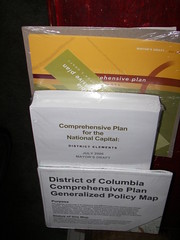I need your advice about my position about the DC Comprehensive Plan
 Should L'Enfant's Plan for the City of Washington set a high bar for all subsequent planning initiatives?
Should L'Enfant's Plan for the City of Washington set a high bar for all subsequent planning initiatives?Next week there is a hearing on the DC Comprehensive Plan revision. A lot of work has gone into the process and a huge document has been created. My position has been that it is a great effort but more like a good discussion draft. And therefore the time to approve it should be extended, so that it is truly improved before it becomes law.
Many leading citizens groups in the city have called for another round of revision before moving forward. I tend to agree with them. If this were a dissertation or thesis submitted by the author as a final product, it would be returned to the author for revision, it would not be deemed acceptable as is.
But there is a lot of pressure to go forward, people have asked me to testify in favor, and other citizens and advocacy organizations (not just the developers) are saying approve now. For example, the Sierra Club just sent out their advocacy e-letter with a section clamoring for support of the Plan too, writing:
The DC City Council needs to hear from residents supporting our city's new Comprehensive Plan, which is a vision for smart growth and inclusive neighborhoods. Contents of the new Comp Plan are summarized on the website of the Coalition for Smarter Growth. You can also read the comments of the Sierra Club on the Plan’s Transportation Element here on our website.
Join us in supporting a positive vision for the future of our city. Through the new Comp Plan, we can create vibrant, walkable mixed use centers around transit stations, protect residential neighborhoods, save and create more affordable housing opportunities, enhance our neglected parks and open space, and revitalize commercial areas so they serve a variety of neighborhood needs.
More details here.
Personally, I think the Transportation Element is weak, the Elements need to be reordered, the Arts & Culture Element is very weak, that Urban Design should be determined to be the #1 Element, and all the Area Elements are particularly weak. Among other things...
 DC Streetcar Map as depicted in the Comprehensive Plan draft revision.
DC Streetcar Map as depicted in the Comprehensive Plan draft revision. Proposed streetcar lines as laid out in the DC Transit Future study.
Proposed streetcar lines as laid out in the DC Transit Future study.Given the rich history of the city as a planned city, beginning with the L'Enfant Plan and continued by the Senate Park (McMillan) Commission, and continued for most of the century through the National Capital Planning Commission, with their proposals of a Legacy Plan attempting to extend the vision of the L'Enfant and McMillan Plans to the 21st Century, it strikes me that we should live up to that tradition.
To be fair to the Comprehensive Plan Revision Process, they weren't given enough time, and they did great work within those parameters. But the process started off so great, with some excellent policy papers that laid out in a direct and thoughtful way, the many issues the city faces.
Others acknowledge the defects but say "don't let the perfect be the enemy of the good."
I figure that my core competence is being uncompromising for quality, since there are so many forces and pressures advocating for average, if not mediocrity. As the journalist Daniel Howes (of the Detroit News) said to me in an e-conversation:
Compromise is the ally of mediocrity -- and irrelevance.
So do I say:
Approve as is, recognizing the faults, but create a unit that works constantly on improving; or
Not approve, take 6-9 more months to get it right? (And still create a unit that works constantly on improving--there is a unit responsible for the Comprehensive Plan, but it isn't really conceptualized as a research and policy improvement division.)

Index Keywords: urban-design-placemaking; comprehensive-planning



0 Comments:
Post a Comment
<< Home